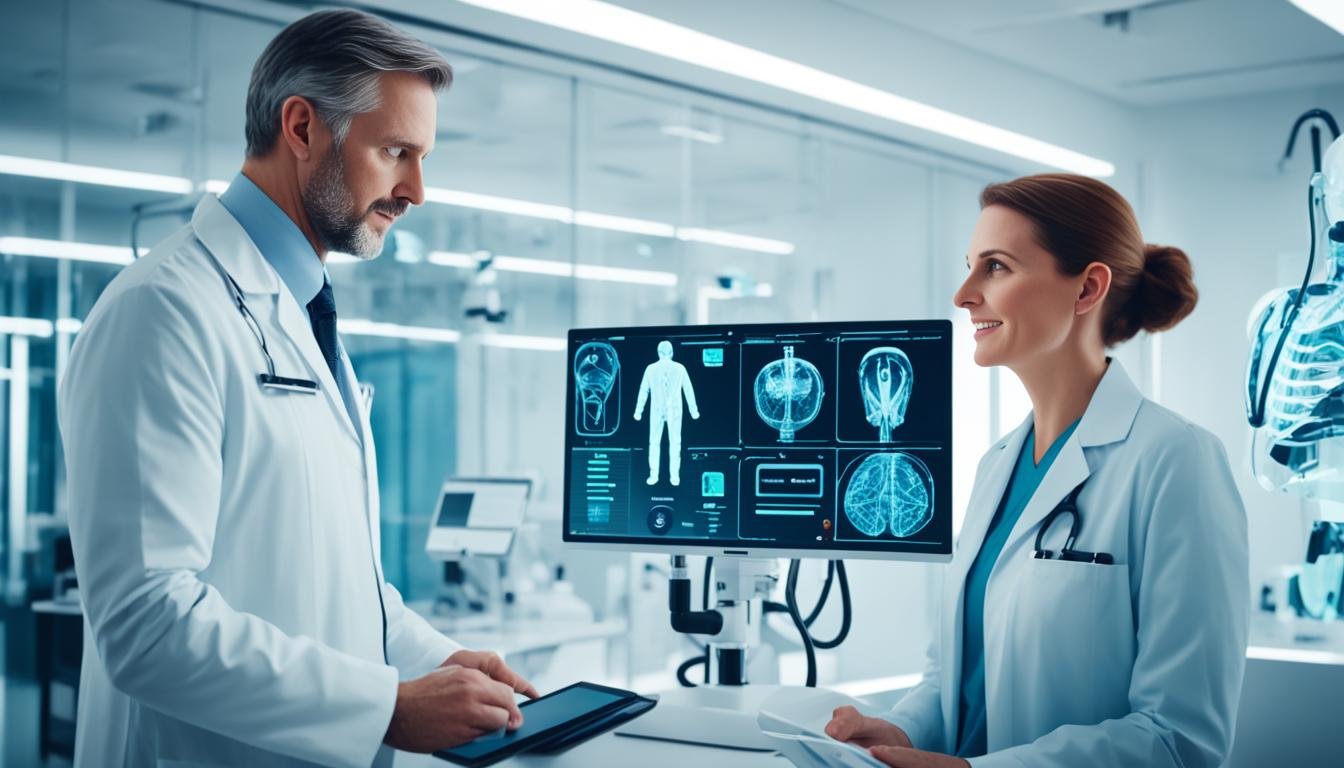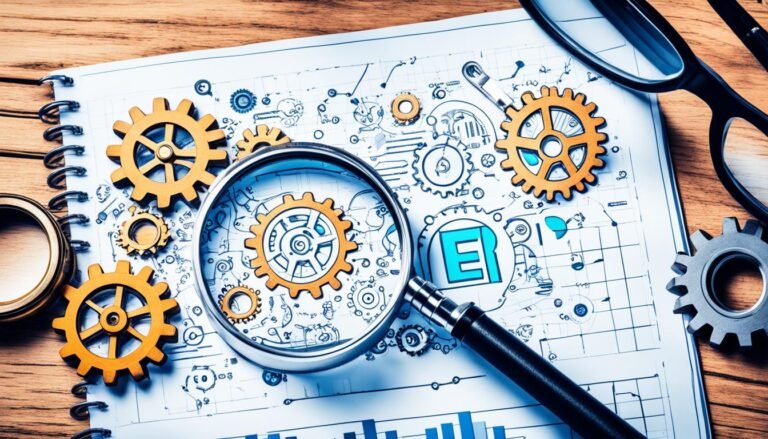How NLP is Transforming Healthcare: Automating Patient Care Through Language Understanding
Ever thought about Natural Language Processing (NLP) and healthcare’s future? It’s reshaping how we work, diagnose, and care for people. With the global electronic health records market hitting close to $18 billion by 2026, and NLP growing 18% each year, it’s exciting to see where this will lead.
Big names like IBM, Microsoft, and Amazon are leading the NLP charge in healthcare. They’ve made tools that can read clinical notes, pull info from medical literature, and sort patient records. Their work, like Intellias’ eHealth platform, proves how crucial NLP is for changing healthcare digitally.
What makes NLP so powerful is its human-like understanding of language. It helps dig up insights from tons of messy patient data. This makes analyzing patient notes more accurate and faster, leading to better care.
Also, NLP lightens the load by handling important tasks and paving the way for custom-tailored healthcare through deep text analysis. These advances chart a course towards smarter health systems that serve patients and run smoothly.
Key Takeaways
- NLP in healthcare is growing at an annual rate of 18%.
- Leaders like IBM, Microsoft, and Amazon are pivotal in NLP research for healthcare.
- The global market for electronic health records is projected to reach $18 billion by 2026.
- NLP helps process and extract insights from unstructured patient data.
- Applications of NLP include clinical notes analysis, administrative task automation, and personalized medicine.
The Role of NLP in Digitizing Medical Records
*Natural Language Processing (NLP)* is crucial in today’s changing healthcare world. It helps by sorting and making sense of a lot of patient data that is messy. Around 80 percent of info in the healthcare world is kind of unorganized or not clear. NLP makes this info useful. It changes notes from doctors into clear, reliable *electronic health records* (EHRs).
The Importance of Data Structuring
Getting data in line is key to really using *electronic health records*. A lot of this info is all over the place, which hinders us from using it well. NLP, the technology that helps with this, is turning messy data into something we can easily work with. It uses smart tools from companies like IBM, Microsoft, and Amazon. This makes it so we can manage data accurately and effectively.
Enhancing the Accuracy of EHRs
Having the right info in *electronic health records* helps doctors take better care of their patients. NLP quickly sifts through notes to find what’s most important. It helps with figuring out the right care for diseases. Plus, it catches any missed or wrong info in the records, making them more trustworthy.
Doctors usually spend a lot of time writing up their notes. NLP makes that information helpful by finding trends. This leads to personalized care for patients and targeted treatments. The demand for these advanced record systems is growing. By 2026, it’s expected to be a nearly US$18 billion market.
NLP Applications in Clinical Decision Support Systems
Natural Language Processing (NLP) is changing how we make healthcare decisions. It combines with machine learning to pull insights from health records. This helps doctors work better, find things faster, and improve how they diagnose.
Predictive Analytics for Patient Outcomes
Thanks to NLP, doctors can now spot trends in patient records. They use this info to predict who might get sick. This leads to better, more personal ways of caring for patients before they get very sick.
Enhancing Diagnostic Accuracy
NLP has a big impact on making diagnoses more accurate. It looks at notes and data to catch problems early. This helps to avoid mistakes with medicine. In the end, it means patients get care that’s spot-on.
How NLP is Transforming Healthcare Operations
The healthcare world is changing fast, thanks to digital advances. NLP, or Healthcare Transformation with NLP, is leading the way. This tech helps by making paperwork and tasks easier. It’s a big help for both patients and workers in the healthcare field.
NLP technology is great at handling lots of data. It turns this data into helpful info for making treatment choices. Big names like IBM, Microsoft, and Amazon are boosting NLP. Their work is making NLP better and better each year, with an 18% growth.
NLP tools are changing how healthcare works in many ways. For example, Optical Character Recognition (OCR) reads text in different forms. Named Entity Recognition (NER) finds important details like patient names and dates. This helps update health records accurately and quickly, which aids in making the best care decisions.
In the field of drugs, NLP sorts through medical notes and patient records. This helps keep everything clear and accurate. So, healthcare providers find that using NLP Technology in Healthcare makes taking care of patients smoother.
Looking ahead, we’re likely to see NLP used more in telemedicine and biotech. Its ability to make sorting through medical data easier will be key. This will lead to more efficient healthcare work and better care for everyone.
Using NLP for Patient Interaction and Engagement
NLP technology is changing how patients and healthcare workers talk. It uses smart software to make conversations better. With NLP, doctors can talk to patients in ways that feel more personal and helpful.
Implementing Chatbots for Initial Diagnoses
NLP-powered chatbots are now the go-to for early patient check-ups. These smart chatbots start the conversation, ask key questions, and help fast with health worries. NLP-Powered Chatbots make sure patients get advice quickly, even if there’s no doctor around.
Analyzing Patient Feedback with Sentiment Analysis
Another big job for NLP in healthcare is reading what patients say. By checking text and social media, NLP understands if patients are happy or not. This helps hospitals and clinics see what they’re doing right or wrong. With NLP Sentiment Analysis in Healthcare, they can get better at making patients happy.
Adding NLP to how patients and doctors chat not only makes folks happier. It also makes healthcare work better for everyone. With NLP, meeting patient needs becomes clearer, creating a more joined-up healthcare journey.
The Advantages of NLP in Medical Imaging
Natural Language Processing (NLP) is changing the game in medical imaging. It’s making things faster and more accurate. With NLP in Medical Imaging, tools quickly understand and describe X-rays and other images. This helps radiologists spot problems early. It improves how accurately issues are diagnosed and makes keeping records easier.
Healthcare’s imaging solutions are getting smarter, thanks to NLP. It pulls out important information from images fast. This means doctors can make the best choices quickly. By 2026, the market for keeping health records online will be big. This shows why we need fast, precise ways to deal with data.
NLP doesn’t just help with looking at X-rays. It also joins records from different places, finding trends that better patient care. NLP makes writing reports automatic. This speeds up and improves the accuracy of what radiologists do for patients.
The NLP healthcare market is growing by 18% each year. Big names like IBM and Amazon are putting effort into this tech. Combining machine learning with NLP in medical imaging is changing how healthcare works. It means better outcomes for patients and more efficient operations.
NLP Techniques and Their Applications in Medicine
Using Natural Language Processing (NLP) in medicine is changing healthcare a lot. It’s making clinical systems better. They do more with patient data. This includes turning paper notes into digital files.
Optical Character Recognition (OCR) in Healthcare
Optical Character Recognition (OCR) is key in healthcare. It turns paper notes, like prescriptions, into digital records. This makes work faster and more accurate. Experts believe OCR and NLP will greatly improve Electronic Health Records (EHRs). By 2026, the EHR market could be worth nearly US$18 billion (source).
Named Entity Recognition for EHRs
Named Entity Recognition (NER) is important in NLP. It finds and sorts important bits in clinical texts. This may include drug names, diseases, or even patient names. NER makes the job of handling EHRs easier. Big companies like IBM, Microsoft, and Amazon are leading the way in NLP’s use for EHRs.
Semantic and Sentiment Analysis in Clinical Notes
Semantic analysis helps understand what words mean in patient notes. This method lets doctors get insights from big batches of unorganized data. It’s about 80% of healthcare documents. Sentiment analysis looks at how patients feel. It helps doctors and other healthcare workers understand and meet patient needs better.
NLP in healthcare is growing by 18% every year. By using things like Semantic Analysis, doctors can work more efficiently. They can provide treatments that fit patients better.
Challenges in Implementing NLP in the Healthcare Industry
Natural Language Processing (NLP) is changing healthcare. Yet, there are key challenges to tackle. These include data privacy, algorithm accuracy, and system reliability. To meet these challenges, as the use of NLP in healthcare grows by 18% each year, it is essential to focus on these aspects.
Data Privacy and Security Concerns
Data Privacy in Healthcare is a top concern. By 2026, the global market for electronic health records is set to hit almost US$18 billion. It is crucial to protect patient data. Leading tech companies are working on secure NLP that meets high data privacy standards. Their solutions aim to protect sensitive health information from breaches. They develop encrypted systems to keep patient records safe from unauthorized access.
Ensuring Algorithm Accuracy and Reliability
Ensuring Algorithm Accuracy is also critical for NLP in healthcare. The complex medical language needs strong algorithms for accurate text analysis. For example, in spotting Kawasaki disease, an NLP algorithm matched a 93.6% accuracy with clinical notes. Yet, maintaining this level of accuracy needs ongoing advancement. The goal is to create NLP solutions that are flexible across various medical specialties. This ensures precise and complete information is extracted.
In short, NLP offers big chances for healthcare. By solving challenges like data privacy and accuracy, healthcare can gain a lot. It can improve patient care, streamline work, and better health outcomes.
Future Visions: NLP Trends in the Health Sector
The role of Natural Language Processing (NLP) in healthcare is set to change a lot. It will help make patient care better and medical processes smoother. By 2026, the worldwide market for electronic health records (EHRs) could hit almost US$18 billion, with NLP playing a key part.
Personalized Medicine with NLP
NLP trends in the health sector show great potential for personalized medicine. NLP looks at EHRs, clinical notes, and what patients say to help doctors give treatments that fit each person. Features like Named Entity Recognition (NER) spot important details like patient names, diagnoses, and drugs. This makes care better.
Integration with Other AI Technologies
The mixing of NLP with other AI tech is changing how healthcare works. Things like deep learning and cloud services make diagnosing and treating patients better. Companies like IBM, Microsoft, and Amazon are at the forefront of using AI and NLP for advanced health solutions.
The teamwork of NLP and AI brings exciting new tools. These range from predicting health issues to keeping patient records up-to-date without manual work. These tools are promising a future where care is both personal and very efficient.
Conclusion
Natural Language Processing (NLP) is changing healthcare by making sense of notes and records. It leads to better diagnoses and treatments planned just for you. This tech also helps cut down on paperwork by doing some tasks on its own.
By reading through patient info such as notes, NLP sees patterns that help treat patients better. Yes, it’s great at improving how doctors make decisions fast. But, making NLP work in healthcare isn’t easy. Keeping patient info safe and understanding different ways people talk are big challenges.
The future of healthcare seems more exciting with NLP. Imagine, systems that keep an eye on patient data all the time. There’s also work on using NLP with AI for smarter diagnosis. And, chatbots that support patients anytime are already here.
NLP is also speeding up how quickly doctors can record what they do. And, it’s helping in finding the right people for clinical studies. This way, NLP is making it all move quicker.
These changes mean we’re heading towards better care and making things run smoother. But, we need to be careful. Caring about privacy and working with AI experts in the right way is key. This journey marks a huge change in healthcare. It will make a huge difference for both patients and those who look after them.
Source Links
- https://intellias.com/natural-language-processing-nlp-in-healthcare/
- https://www.foreseemed.com/natural-language-processing-in-healthcare
- https://www.ncbi.nlm.nih.gov/pmc/articles/PMC6528438/
- https://www.xevensolutions.com/blog/applications-of-nlp-in-healthcare/
- https://fastdatascience.com/nlp-in-healthcare/
- https://www.ncbi.nlm.nih.gov/pmc/articles/PMC6616181/
- https://www.xcubelabs.com/blog/nlp-in-healthcare-revolutionizing-patient-care-with-natural-language-processing/
- https://www.linkedin.com/advice/3/how-can-nlp-used-improve-healthcare-communication
- https://www.shaip.com/blog/nlp-in-radiology/
- https://marutitech.com/use-cases-of-natural-language-processing-in-healthcare/
- https://retinalscreenings.com/blog/5-things-to-know-about-nlp-in-healthcare/
- https://www.ncbi.nlm.nih.gov/pmc/articles/PMC8285156/
- https://www.linkedin.com/pulse/natural-language-process-nlp-healthcare-current-future-kevin-lewis-2qskc
- https://www.linkedin.com/pulse/nlp-healthcare-improving-patient-care-through-text-analysis-rr9fc
- https://www.wissenresearch.com/blog/healthcare-with-natural-language-processing/








